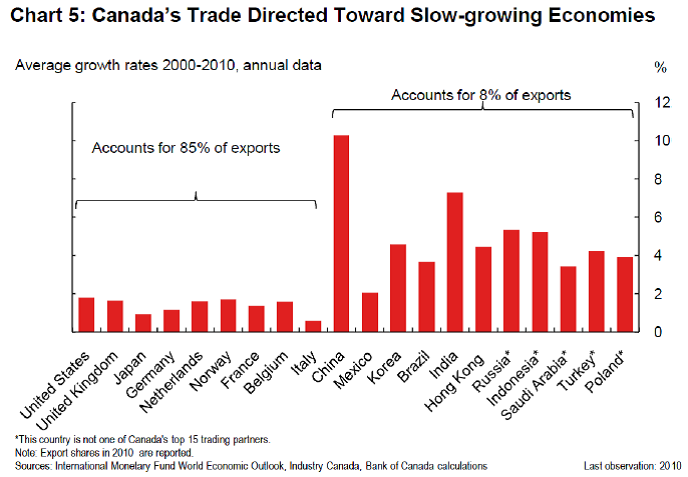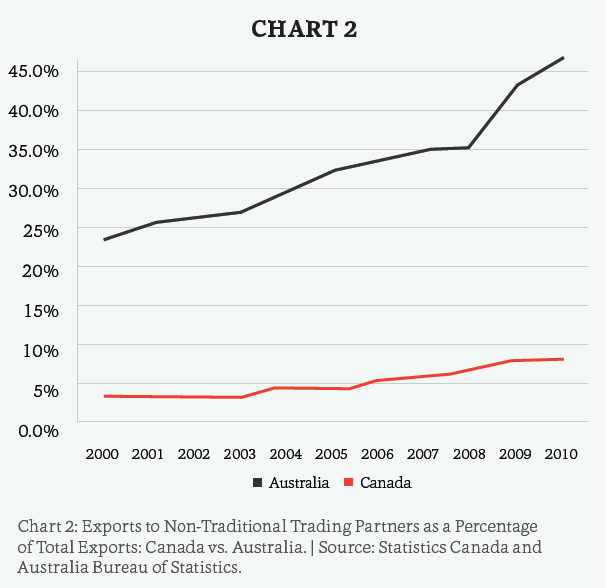Report: Canada Must Prioritize Trade with Emerging Economies
A recent report by Gowlings law firm in collaboration with Carleton University’s Norman Paterson School of International Affairs is a laundry list of recommendations to reform government policy and business thinking and behaviour for a major transformation of Canada’s international trade.
Winning in a Changing World: Canada and Emerging Markets, sounded the alarm bell for Canada to strengthen its relationship with rapidly developing markets, especially East Asia, or risk falling behind in an increasingly competitive export environment.
Presented to Prime Minister Harper, opposition leaders and premiers, the report leveraged Mark Carney’s, Governor of the bank of Canada, recent remarks on Canada’s faltering trade since 2000. Canada performed second worst among G-20 countries, almost 5% slower than average global export growth with Canada’s share of world totals plummeting from 4.5% to 2.5%. 85% of Canadian trade continued to be with the US and other slow moving developed country trading partners. 
 Emerging economies, including China, India, Korea, Indonesia, Brazil, Russia, along with Saudi Arabia and Turkey, by contrast, accounted for about 2/3 of global economic growth and 1/2 of import growth. Citing various studies, the report noted that China will surpass the US in size by the end of the decade and global trade will nearly quadruple in a further ten years. By mid century, emerging markets will account for 70% of global wealth and 60% of world trade with Asian countries taking up 50% of world production. North America’s share of global trade will shrink by nearly 1/2 to a mere 8%.
Emerging economies, including China, India, Korea, Indonesia, Brazil, Russia, along with Saudi Arabia and Turkey, by contrast, accounted for about 2/3 of global economic growth and 1/2 of import growth. Citing various studies, the report noted that China will surpass the US in size by the end of the decade and global trade will nearly quadruple in a further ten years. By mid century, emerging markets will account for 70% of global wealth and 60% of world trade with Asian countries taking up 50% of world production. North America’s share of global trade will shrink by nearly 1/2 to a mere 8%.
Governor Carney spelled out three factors contributing to Canadian export malaise: declining competitiveness due to a strong dollar, rising wages, and productivity declines; failure of Canadian businesses to adapt to a rapidly changing world; and lack of focus on the best markets while being fixated on the US.
All this points to an ‘inescapable conclusion’: “It’s time for major efforts that strengthen Canada’s relationships with emerging markets, especially in Asia…the relationships will prove much more rewarding than those with our traditional trade and investment partners”.
The report singled out Australia for its successful diversification of trade to southeast and northeast Asia since the 1980s. The Auzzies became more export-oriented and aggressively pursued Asian markets. In the food sector alone, Australia phased out supply management, allowing it to become the biggest supplier of dairy products and meat to the region. Australia also launched aggressive and comprehensive programs to attract Asian students to its universities. Nowadays, 50% of Australia’s global trade is engaged with Asia and half of that is with China.  Among the report’s 14 major recommendations, a few stood out: Most important, Canadian political and business leaders must promote greater awareness of the growing importance of emerging markets, especially East Asia, and Canada must reorient its political and commercial resources to target key countries. Just as important, Canadian businesses must reject their “culture of comfort” that is severely risk-averse, causing them to eschew innovation in favour of easy profits, particularly from south of the border.
Among the report’s 14 major recommendations, a few stood out: Most important, Canadian political and business leaders must promote greater awareness of the growing importance of emerging markets, especially East Asia, and Canada must reorient its political and commercial resources to target key countries. Just as important, Canadian businesses must reject their “culture of comfort” that is severely risk-averse, causing them to eschew innovation in favour of easy profits, particularly from south of the border.
While Canada’s largest firms are already well-entrenched in Asian markets, establishing strong ties with local partners for the long haul, small and medium-sized Canadian firms (SMEs) remain preoccupied with short-term returns in North America.
“For many SMEs, the US market has provided as much of a challenge as they are willing to take on (but) investors should be prepared to let SMEs become large enough to play significant roles in the global economy”, the report advised.
The report also called upon Canadian universities and colleges to augment foreign language training (particularly East Asian languages) and promote international exchange programs to attract students from the Asia-Pacific region and beyond. Interestingly, the report urges introducing key foreign language instruction, notably Mandarin, at the secondary level to help open doors for young Canadians in East Asia.
To enhance engagement in the broader global economy, major changes must happen in public policy and business leadership: First, Canada must reform its tax system to promote innovation and productivity gains and which is competitive internationally, especially with emerging markets. Second, policies and practices of a bygone era must be streamlined.
On the one hand, the regulatory process for FDI must be simplified and consolidated for major projects in energy, mining and infrastructure. On the other hand, more efforts must be made to promote leading Canadian sectors such as aerospace, financial services, IT, and agriculture in emerging economies. Canadian companies must improve their productivity and Canada’s national infrastructure – transmission grids, ports, pipelines, terminals, roads, etc. – must be renewed and extended.
“The need for strategy, focus, and leadership is critical. Canada cannot afford to continue to fall behind…Canada has the potential to meet the demands of a rapidly changing global economy. What is missing is a determined effort to leverage our strengths and to reshape Canadian policies and priorities”, the report concluded.
